The Syrian crisis has entered its eighth year. More than 3.5 million people displaced by the violence there have sought refuge in Turkey. Their numbers, through births and new arrivals, are increasing by approximately 1,000 people per day. They join half a million more asylum seekers and refugees from other countries.
Despite an otherwise difficult, at times suffocating, political environment in Turkey, civil society groups and local governments there are implementing promising projects designed to address the challenge of integrating these people. Needed now is a national strategy for the long term and greater international burden sharing.
Key Actors: Cities and Civil Society
Municipalities are at the forefront of managing the Syrian refugee situation in Turkey. More than 95 percent of Syrians in Turkey reside in urban centers. Kilis, which lies on the border with Syria, hosts more Syrian refugees than Turkish residents. In Istanbul, there are at least 560,000 registered Syrian refugees. Zeytinburnu, a district of the city, hosts more than 50,000 of them.
Municipalities have been particularly innovative in their efforts to accommodate refugees by running free language courses, instituting social support programs, permitting a degree of legal flexibility for Syrians opening businesses, and in the case of at least one district, Bağcılar, encouraging Syrians to participate in advisory citizens’ councils. The Marmara Municipalities Union, which includes nearly 300 local governments in Istanbul and its surrounding regions that collectively represent more than 20 million residents, houses a migration policy center that enables its constituents to share best practices, coordinate refugee support activities, and develop evidence-based policies to promote integration.
Local civil society initiatives are also critical to fostering integration. Organizations such as the Association for Solidarity with Asylum Seekers and Migrants (ASAM) run numerous community centers for Syrian and other refugees that provide a range of support services. ASAM also runs UNHCR’s (the United Nations High Commissioner for Refugees) pre-screening of asylum seekers in Turkey. Many local NGOs work closely with their international counterparts, U.N. agencies, and increasingly, NGOs established by Syrian refugees themselves. Last month, a group of Turkish NGOs led by Oxfam Turkey and the Research Center on Asylum and Migration organized an International Refugee Congress with the participation of representatives from close to 100 institutions from nearly 30 countries. The congress adopted a communiqué calling for better representation and participation of both host and refugee communities in international policymaking processes. At the encouragement of Turkey’s Ministry of Foreign Affairs (MFA), the organizers shared the communiqué with UNHCR and other stakeholders in Geneva earlier this month.
What Role for Turkey’s National Government?
These municipal and civil society efforts have been made possible in no small part by the Turkish national government’s commitment to meeting protection needs of Syrian refugees. Ultimately, however, local authorities and civil society leaders are looking to the national government to develop a long-term integration strategy. Instead, the government has been hesitant and of two views. It continues to treat their presence as temporary.
While it has undertaken numerous projects to promote refugee integration, those have been largely ad hoc. A broader strategy is lacking. Turkey’s employment agency (ISKUR) and International Labor Organization, International Organization for Migration, UNHCR, World Bank, U.N. Development Programme, and the European Union are cooperating closely to prepare the legal and administrative basis for extending access to labor markets for Syrian refugees, and to develop vocational training programs to improve their employability. The Turkish government is also working to expand access to formal education for Syrian children. Today, more than 20,000 Syrian students are in Turkish universities. Cooperation between Turkey and the EU with respect to funding these policies is quiet but sustained. The Turkish MFA is also actively engaged in the process of finalizing the new Global Compact for Refugees. It has formed a caucus of countries hosting large numbers of refugees, advocating for a greater voice in international policymaking.
Enormous Challenges Remain
Despite these promising developments, enormous challenges remain. Polls such as the “Syrians Barometer-2017” illustrate that among large segments of the Turkish public, Syrian refugees are resented. They are viewed as a burden, and blamed for deteriorating public services, price increases, and rising unemployment. Although the Turkish government has emphasized cultural and religious affinities with Syrian refugees, the public perceives a surprisingly large cultural and social distance. There are consistent reports of tension between refugees and locals. This makes it difficult for the Turkish government to be forward-leaning on a strategy for integration that acknowledges Syrians are not likely to go home any time soon. Turkey’s president, Recep Tayyip Erdoğan, recently justified Turkey’s military intervention into northern Syria by advocating that its aim was, in part, “to help return Syrian refugees to their homes.” He added: “they will not stay forever here.”
For municipalities, there are additional complications. By law, local governments are mandated to serve citizens and only citizens. This limits their ability to provide services for refugees. It also means local governments do not receive dedicated financial resources to support refugees. Municipal leaders also fear that by providing services to Syrian refugees, they risk attracting more refugees from other localities. That could further strain existing resources, as well as relationships between new arrivals and longtime residents. Districts in Istanbul that have been recognized for implementing best practices—including Zeytinburnu, Bağcılar, and Sultanbeyli—have seen their refugee populations increase. Burden sharing and coordination are a challenge locally as much as they are globally. These complications result in real gaps in service delivery.
Another persistent challenge is ensuring access to education for all Syrian refugee children. A third of them remain out of school. There are also persistent reports of child labor and early marriage.
Finally, there are significant challenges with respect to livelihood opportunities. In spite of legislation adopted in 2016 to facilitate access to the labor market, thus far barely 20,000 work permits have been issued. Yet, an estimated one-and-a-half million Syrians work informally, and as a result, are vulnerable to exploitation. Nearly one-third of the Turkish economy is estimated to be based on informal employment, which further complicates the picture.
What next?
As the world prepares to mark World Refugee Day it is worth recognizing the important role Turkey plays in hosting large number of refugees—and facing the challenges that come with doing so. In addressing these challenges, the Turkish government would be well-served to engage the experience and know-how of municipalities and civil society to develop and implement a strategy for integration. In turn, the international community should be more receptive to Turkish government efforts to achieve a greater say for refugee hosting countries and to ensure that burdens are more evenly shared. Doing so would help strengthen Turkey’s resilience and improve the well-being of the many millions of Syrian refugees living there. That, in turn, can help ensure that when the next major refugee crisis occurs, Turkey will be willing and prepared to keep its doors open.
The Brookings Institution is committed to quality, independence, and impact.
We are supported by a diverse array of funders. In line with our values and policies, each Brookings publication represents the sole views of its author(s).

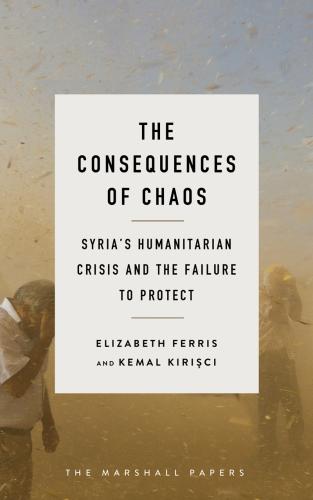
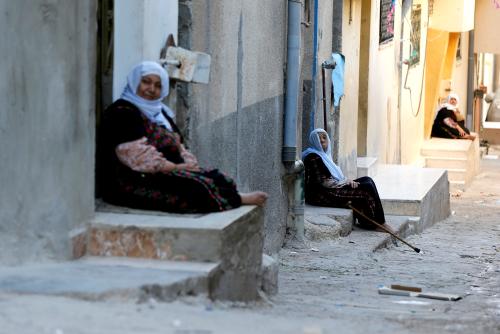
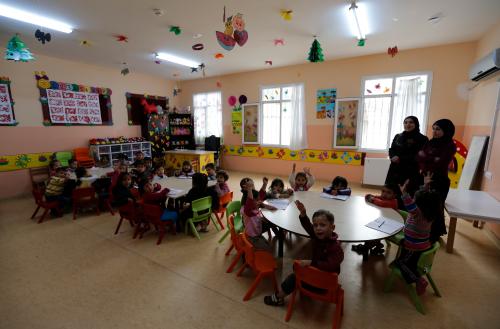
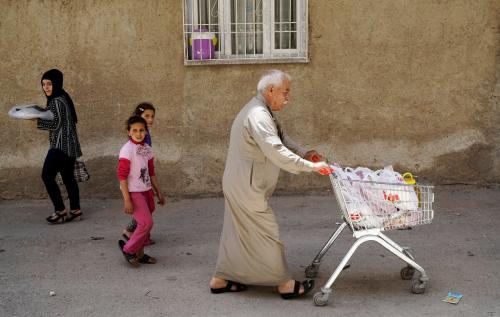




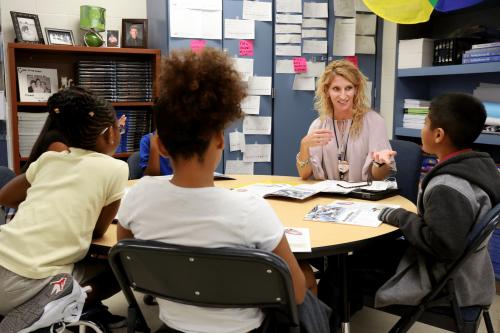

Commentary
Syrian refugees in Turkey: Beyond the numbers
June 19, 2018